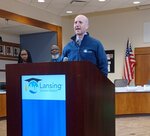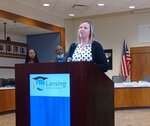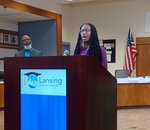


WEDNESDAY, May 15 — The Lansing School District is one of just 13 districts nationwide to be named a 2024 recipient of the U.S. Department of Energy’s 2024 Efficient and Healthy Schools program award.
“The fact that we’re on the same list as Broward County, Boise and Portland, Oregon, really shows you the kind of level that our district is playing at right now,” Superintendent Benjamin Shuldiner said at a press conference today.
The program, which has 202 participants from schools in 45 states, “recognizes and provides technical assistance for schools seeking to implement high-impact energy efficiency and indoor air quality improvements in their buildings,” The U.S. Energy Department’s website said.
Shuldiner touted the designation as another step towards the district’s ambitious sustainability goals. He said the district was singled out for “planning and future effort,” one of three categories in the program.
“We, over the next couple of years, are going to really try to rethink how we use energy in this district and how we create our buildings and our entire district to be more efficient and green,” Shuldiner said at the Rogers Administration Building.
The Lansing School District was one of two in Michigan to receive the award, joining Livonia Public Schools. The others were the Boise School District in Idaho, Broward County Public Schools in Florida, the Canajoharie Central School District in New York, Hamilton Southeastern Schools in Indiana, IDEA Public Schools in Texas, Loudoun County Public Schools in Virginia, School District of Neillsville in Wisconsin, Porterville Unified School District in California, Portland Public Schools in Oregon, River Trails School District in Illinois, and Seattle Public Schools.
Submissions were evaluated on their “approach, outcomes, impacts, education and workforce training.” The program aims to connect the chosen districts with “practical solutions so that they are ready to use public funding and other resources for infrastructure improvements.” It particularly emphasizes schools in rural and tribal areas and those that serve students in “disadvantaged communities.”
Shuldiner thanked Kristina Tokar, the district’s chief operating officer, for overseeing “a dramatic shift in how we think about our buildings.”
Tokar highlighted several projects to install energy-efficient LED lighting.
“We completed that project at Sexton High School and Lyons Elementary, and we’ve started that at Everett High School as well,” Tokar said. “We’ve also begun using the EnergyStar data tracking system.”
“You’re going to see a lot of solar and geothermal work, and we’re super excited about all of that,” she added.
The district has also partnered with other organizations to bolster its green efforts, including GreenLink, a minority and women-owned public benefit company that helps schools and nonprofits address climate change.
GreenLink president Karin Goldmark touted the Lansing School District’s sustainability plan as “ambitious.”
“They’re working on essentially every sector of the schools, from buildings to solar to electric school busses,” Goldmark said. “We’re thrilled because not every school district has students at the center of the work, and those efforts are really bearing fruit for the district.”
One of GreenLink’s newest interns is Cadence Jackson, a junior at Sexton High School. She’s been working with Goldmark and her team since February.
“It’s a lot of research, a lot of communicating between departments, and mostly applying for grants and recognitions just like this one,” Jackson said.
Jackson said she was certainly interested in continuing her work with environmental sustainability, though she added that she could also see herself getting into politics or social work. Nonetheless, she said the internship has opened up new avenues for her future.
“I definitely want to do something that involves community work, and I’m honored to be able to take those first steps with GreenLink,” she said.
On June 11 and 12, Tokar and a cadre of the district’s students will travel to Denver to formally accept the award at a sustainability conference.
Shuldiner said the green efforts began last year, after the federal Inflation Reduction Act took effect.
“It allowed school districts to actually get support to do green work. So, we are looking at solar on the roofs, EV buses, geothermal, all of that,” he said.
“It isn’t just good enough to make sure that the schools are clean,” he added. “Now, we have to rethink them in terms of are they great learning environments, are they healthy learning environments? We’re excited to build off of what we’ve started here.”
Support City Pulse - Donate Today!
Comments
No comments on this item Please log in to comment by clicking here